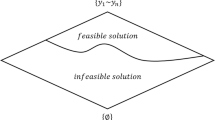Abstract
Model-based diagnosis enables isolation of faults of a system. The diagnosis process uses a set of sensors (observations) and a model of the system in order to explain a wrong behaviour. In this work, a new approach is proposed with the aim of improving the computational complexity for isolating faults in a system. The key idea is the addition of a set of new sensors which allows the improvement of the diagnosability of the system. The methodology is based on constraint programming and a greedy method for improving the computational complexity of the CSP resolution. Our approach maintains the requirements of the user (detectability, diagnosability,...).
Preview
Unable to display preview. Download preview PDF.
Similar content being viewed by others
References
Reiter, R.: A theory of diagnosis from first principles. Artificial Intelligence 3(1), 57–96 (1987)
de Kleer, J., Mackworth, A., Reiter, R.: Characterizing diagnoses and systems. Artificial Intelligence 2-3(56), 197–222 (1992)
Dressler, O., Struss, P.: A toolbox integrating model-based diagnosability analysis and automated generation of diagnostics. In: DX03, 14th International Workshop on Principles of Diagnosis, Washington, D.C., USA, pp. 99–104 (2003)
Travé-Massuyés, L., Escobet, T., Spanache, S.: Diagnosability analysis based on component supported analytical redundancy relations. In: 5th IFAC Symposium on Fault Detection, EEUU (2003)
Console, L., Picardi, C., Ribaudo, M.: Diagnosis and diagnosability analysis using PEPA. In: ECAI 2000, Proceedings of the 14th European Conference on Artificial Intelligence, Berlin, Germany, pp. 20–25. IOS Press, Amsterdam (2000)
Ceballos, R., Gómez-López, M.T., Gasca, R., Pozo, S.: Determination of Possible Minimal Conflict Sets using Components Clusters and Grobner Bases. In: DX04, 15th International Workshop on Principles of Diagnosis, Carcassonne, France, pp. 21–26 (2004)
Hansen, M.C., Yalcin, H., Hayes, J.P.: Unveiling the ISCAS-85 Benchmarks: A Case Study in Reverse Engineering. IEEE Design and Test of Computers 16(3), 72–80 (1999)
Harvey, W.D., Ginsberg, M.L.: Limited discrepancy search. In: Fourteenth IJCAI, Montreal, Canada, IOS Press, Amsterdam (1995)
Author information
Authors and Affiliations
Editor information
Editors and Affiliations
Rights and permissions
Copyright information
© 2006 Springer-Verlag Berlin Heidelberg
About this paper
Cite this paper
Ceballos, R., Cejudo, V., Gasca, R.M., Del Valle, C. (2006). A Topological-Based Method for Allocating Sensors by Using CSP Techniques. In: Marín, R., Onaindía, E., Bugarín, A., Santos, J. (eds) Current Topics in Artificial Intelligence. CAEPIA 2005. Lecture Notes in Computer Science(), vol 4177. Springer, Berlin, Heidelberg. https://doi.org/10.1007/11881216_7
Download citation
DOI: https://doi.org/10.1007/11881216_7
Publisher Name: Springer, Berlin, Heidelberg
Print ISBN: 978-3-540-45914-9
Online ISBN: 978-3-540-45915-6
eBook Packages: Computer ScienceComputer Science (R0)




